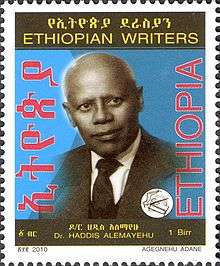Haddis Alemayehu

Haddis Alemayehu (Amharic: ሀዲስ ዓለማየሁ; haddis alämayähu, 15 October 1910 – 6 December 2003), also transliterated Hadis Alamayahu, was a Foreign Minister and novelist from Ethiopia. His Amharic novel Fəqər əskä Mäqabər (Love to the Grave, 1968) is considered a classic of modern Ethiopian literature.
Biography
He was born in the Endor Kidane Miheret section of the city of Debre Marqos, the son of an Orthodox priest, Abba Alemayehu Solomon and his mother Desta alemu. He grew up with his mother. As a boy, he began his education within the system of the Ethiopian Orthodox Church, studying at the monasteries of Debre Elias, Debre Werq, and Dima Giorgis where he finally graduated in Qine (type of extended Ethiopian orthodox church education). Later, he moved to Addis Ababa where he attended several schools, including the Swedish mission school (1925–27) and later at the Tafari Makonnen School for further education of the secular sort (EthioView 12 December 2003). He wrote his first play during this period, YeHabeshan yewedehuala Gabcha (The marriage of habesha and its backwardness) which displayed remarkably mature style. In the early 1930s Hadis returned to Gojam and worked as a customs clerk and school headmaster before moving to a teaching position at Debre Markos. Haddis Alemayehu fought during the Italian-Ethiopian war for colonialism (1935–36) until he was captured and sent to the Island of Ponzo in the western Mediterranean and then to the island of Lipari, near Sardinia.
Freed by allied forces Haddis finally returned to Ethiopia (1943). After brief stints in the department of Press and Propaganda and Ministry of Forein Affaires,he became the Ethiopian consul in Jerusalem(1945–46), where he stayed for about two years.There he met and married Kibebe-tsaehay Belay,who had lived and had been brought up in Jerusalem. Haddis then served as a delegate to the international communications conference in Atlantic City, New Jersey (1946). Afterwards, he received a posting to the Ethiopian mission in Washington, D.C. and at the United Nations (1946–50). His next assignment was in the Ethiopian Foreign Ministry, first as General Director and then as Vice Minister. During the 1956–1960s he worked as Ethiopian representative to UN. After his return Haddis briefly worked at the Ministry of Education (1960) followed by appointment as Ambassador to Britain and Netherlands (1960–65).
After his recall to Ethiopia, Haddis, who was not in good health, preferred not to enter into government service. Reluctantly, he agreed to become a minister of Planning and Development (1965–66) and also served in the Ethiopian Senate (1968–74). During the era of the first two years of Derg regime (a newly brought military government taking the advantage of mass revolution), Haddis served as a member of the advisory body that had been created to replace the dissolved parliament. However he declined the Derg's offer to become Prime Minister, thus removing himself from any meaningful governmental roles. In the meantime he returned to his literature career when he published Fikr Eske Mekabr, his famous novel about love in a feudal Ethiopia. Not only this, he had written Wongelegnaw Dagna (the criminal judge) and yelemezat (sweet only in dreams) and others. He was eventually awarded an honorary doctorate by Addis Ababa University.
List of publications
- Y-Abeša-nna Ye-Wedehʷala gabičča (The Marriage of Ethiopia and the Future)
- Teret Teret Ye-Meseret, 1955 (1948 AM)
- Fəqər əskä Mäqabər (Love to the Grave), Bərhanənna Sälam Printing Press, 1965 (1958 AM)
- Wenǧeläñña Dañña (The Criminal Judge), Addis Abeba:nəgd Printing Press (Kuraz Publishing Agency) 1981 (1974 AM)
- Ye-Ilm Ižat, Addis Abeba: nigd Printing Press (Kuraz Publishing Agency) 1987 (1980 AM)
- Tizzita (Memories), Addis Abeba:Artistic Printing Press (Kuraz Publishing Agency) 1992 (1985 AM)
References
- Thomas L. Kane. Ethiopian Literature in Amharic. Wiesbaden: Harrassowitz 1975. ISBN 3-447-01675-2
- Hailu Fulass, "Realism in Haddis Alemayehu", in: Taddesse Adera & Ali Jimale Ahmed, Silence is not golden : a critical anthology of Ethiopian literature. Lawrenceville, NJ: Red Sea Press 1995. ISBN 0-932415-46-6. ISBN 0-932415-47-4.
- Reidulf K. Molvaer. Black Lions: the creative lives of modern Ethiopia's literary giants and pioneers. Lawrenceville, NJ: Red Sea Press 1997. ISBN 1-56902-016-7. ISBN 1-56902-017-5.
- Girma Abebe. "Addis Alemayehu (1910–2003)", International Journal of Ethiopian Studies, Vol. 1, No. 2 (Winter/Spring 2004), pp. 166–168.
External links
- All Africa
- FiQir Iske MeQabir – An Ethiopian Masterpiece, a book review by Haeran Fisseha in Seleda Journal website (Vol. II, Issue VII, January 2001).
- "Grateful, forever (A tribute to a literary giant – Haddis Alemayehu)", a poem by Kiros Berhane (December 2003), in Meskot Online Literary Journal.
- Amharic text of Fəqər əskä Mäqabər (Love to the Grave)
- Deconstructive Discourse of Content as Reflected in Haddis Alemayehu’s Fikir Eske Mekabir, MA thesis
|
